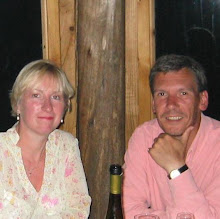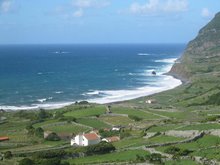Effective 7 April 2013, Corvo's cargo service ceases to be maintained by local Flores company, Maré Ocidental (literally "Western Tide"), and is replaced by a rival firm from the island of Pico, Amaral Felicianos e Faria, Lda. (AFF). Maré Ocidental has undertaken the Corvo sailings through three generations of the Lopes family: the first of these, the late José Augusto Lopes, was awarded the Portuguese equivalent of an OBE in 1994 for services to his community:-
This may need some explaining for British readers. If Corvo were an island off the coast of Britain (typically Scotland), then cargo - i.e. stuff you take for granted that you can buy in shops and petrol and things like that - would go on a lorry which drives on to a ro-ro ferry at a place like Oban or Ullapool, drives off and delivers its stuff to the island shops, then drives back on to the ferry the following day and returns to the mainland. On Corvo, there is no lorry and the stuff (having arrived on Flores in containers in a container ship) gets loaded by a crane individually (on pallets or smaller containers) onto a little cargo ship. Apart from the very smallest of islands (Fair Isle, Foula and North Ronaldsay in Orkney and Shetland with an average population of about 50 are the only ones I can think of), that doesn't happen in Britain. Below is a picture of stuff for Corvo in a small container being loaded on to Maré Ocidental's ship, the Santa Iria at Lajes on Flores:-
What that picture doesn't capture is that the Santa Iria was heaving about at the pier in the swell making it an extremely skillful job for the crane operator to drop the container into the hold - note the dimesions of the aperture in the ship's deck relative to the size of the container. Not easy. Below is a picture of the Santa Iria unloading at Corvo:-
Note the strong similarity between the Santa Iria and the Good Shepherd IV which serves Fair Isle, an island (pop. 69) 25 miles (40km) from Shetland in Scotland:-
 |
| Photo credit Ian Leask |
MO also ran pleasure sailings to Corvo and around the coast of Flores (in a different boat) during the summer. They also have premises in Fajã Grande where you can hire bikes, scooters and kayaks etc. in summer. But without their core contract of carrying the cargo to Corvo, it's been announced the firm is to close with loss of eleven jobs. I don't know what's going to happen to the Santa Iria (or the scooters and kayaks). Given that Fair Isle is already taken care of, I expect there must be quite a restricted market for such vessels.
 |
| En route to Corvo on the Santa Iria in 2009 |
 |
| Photo credit ferrymanjgb |
I totally get why public subsidy has to be put out to tender and that this may inevitably involve a loser. But two things from similar situations in Scotland where I come from. First, the subsidised shipping services to the Scottish islands (pictured above) are periodically put out to tender. But it's always made a condition that the winning bidder must employ the outgoing contractor's people. To put that another way, any company submitting a bid must demonstrate that there is no "good reason" why the normal consequences of TUPE won't apply or their bid won't be considered.
Second, there was an awful hoo-hah recently when the hunting rights on a Scottish island called Raasay (above) which belongs to the government were auctioned. The lease was awarded to a company from elsewhere in Scotland which had bid only £2k (=2.2k€) higher than a syndicate of local crofters (small farmers) which had held the lease for a number of years. There was no question of anyone losing their jobs here and, on one view, the govt. had done the right thing by awarding the lease to highest bidder. But as the Scottish soi disant Government also espouses localism, shouldn't it have a policy of weighing in the balance the benefits of keeping contracts within local communities even if that's at the expense of a few thousand pounds a year?
I'm not aware there's been a similar hoo-hah in the Azores over the Corvo shipping contract. If it had happened in Scotland, it would have been be headline news. Maybe I just don't read the right websites. Maybe Azoreans have a more amanhã attitude than we uptight Brits do.










1 comment:
In 1997 I built a whaleboat in Horta with Joao Tavares of Pico. After we launched Bela Vista we flew to Flores to do some work for the Augustos family. I would love to be in contact with them again as I am planning on sailing to Flores this summer from Maine. -- Bruce Halabisky
Post a Comment